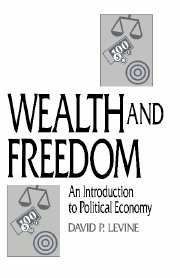Book contents
- Frontmatter
- Contents
- List of figures and tables
- Preface
- Introduction
- I Economy and society
- II Capitalism
- III Inequality and difference
- 7 The classical argument for inequality
- 8 Income and productive contribution
- 9 Rights and the market
- 10 Poverty and inequality
- IV International society
- V Individual and community
- References
- Index
9 - Rights and the market
Published online by Cambridge University Press: 20 March 2010
- Frontmatter
- Contents
- List of figures and tables
- Preface
- Introduction
- I Economy and society
- II Capitalism
- III Inequality and difference
- 7 The classical argument for inequality
- 8 Income and productive contribution
- 9 Rights and the market
- 10 Poverty and inequality
- IV International society
- V Individual and community
- References
- Index
Summary
Rights
The argument for distribution according to productive contribution suggests that we judge how incomes are distributed by comparing the actual distribution with an ideal state in which each receives an income equal to his contribution. A deviation from this state would be unfair. Thus, if the worker's contribution equals the sum of profits and wages (the whole net product), then the producer, in selling the good, acquires value to which the worker could make a claim. This is exploitation in the sense considered in the previous chapter. But a problem arises in making this judgment.
The employer hired the worker for a set amount agreed upon between them and explicitly written into their contract. Each party to the contract agreed to trade something he owned: one, money; the other, his or her laboring capacity. The property rights of each party were respected in the transaction. If we link the justness of income distribution to respect for the rights of the parties, the distribution resulting from voluntary contract is just whatever the relation is between it and productive contribution. Thus how we judge distribution depends on the criterion we use: productive contribution or respect for property right.
When we link distribution to productive contribution, we set up an ideal distribution we can use to determine if the actual distribution is fair or not. When our income falls short of our contribution, distribution deviates from the ideal.
- Type
- Chapter
- Information
- Wealth and FreedomAn Introduction to Political Economy, pp. 99 - 113Publisher: Cambridge University PressPrint publication year: 1995



